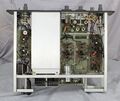1394: Difference between revisions
(→Photos) |
No edit summary |
||
| Line 15: | Line 15: | ||
}} | }} | ||
The {{Title|General Radio 1394 Hi-Rate Pulse Generator}} was introduced in {{Catalog T}} and remained available through {{Catalog T}}. | The {{Title|General Radio 1394 Hi-Rate Pulse Generator}} was introduced in {{Catalog T}} and remained available through {{Catalog T}}. | ||
The Type 1394 is a pulse generator capable of 100 MHz repetition rate with a rise and fall time of 2 ns. It can generate pulses triggered by an internal oscillator or external source. Internally the pulse frequency is between 10 and 100 Mhz, front panel adjustable. External pulse rate is from dc to 100 Mhz with adjustable sensitivity, trigger level, and choice of slope. The output pulse width is controlled by series of eight panel switches, marked in nanoseconds and sum the pulse width. Another set of switches below are used to control pulse delay, again labeled in nanoseconds and sum the pulse delay. Amplitude and polarity of the output pulse are adjustable using panel controls. Front panel connectors for Pulse Output, External PRF In, and Synchronization Pulse Out can be relocated the rear of the instrument . The Type [[1394-P1]] Pulse-Offset Control is available, it inserts a dc component in the pulse output of the 1394-A so that baseline is regulated to the desired dc reference level, adjustable from -2 to +2 volts. | |||
==Specifications== | ==Specifications== | ||
Revision as of 07:36, 21 May 2024
The General Radio 1394 Hi-Rate Pulse Generator was introduced in Catalog T (1968) and remained available through Catalog T (1968).
The Type 1394 is a pulse generator capable of 100 MHz repetition rate with a rise and fall time of 2 ns. It can generate pulses triggered by an internal oscillator or external source. Internally the pulse frequency is between 10 and 100 Mhz, front panel adjustable. External pulse rate is from dc to 100 Mhz with adjustable sensitivity, trigger level, and choice of slope. The output pulse width is controlled by series of eight panel switches, marked in nanoseconds and sum the pulse width. Another set of switches below are used to control pulse delay, again labeled in nanoseconds and sum the pulse delay. Amplitude and polarity of the output pulse are adjustable using panel controls. Front panel connectors for Pulse Output, External PRF In, and Synchronization Pulse Out can be relocated the rear of the instrument . The Type 1394-P1 Pulse-Offset Control is available, it inserts a dc component in the pulse output of the 1394-A so that baseline is regulated to the desired dc reference level, adjustable from -2 to +2 volts.
Specifications
- Pulse Repetition Frequency
- Internally Generated: 1.0 to 100 MHz, in six ranges
- Externally Controlled: DC to 100 MHz
- Sychronizing-Pulse Output
- Duration: 4 ns
- Amplitude: 250 mVp-p, into 50 Ω
- Delay (between sync pulse and leading edge of output pulse): 0 to 99 ns in 1-ns steps, ±2.5% + 1 ns accuracy
- Output Pulse Characteristics
- Duration: 4 to 99 ns in 1 ns steps, ±2.5% + 1-ns accuracy
- Rise and Fall Times: 2.0 ns ± 20 %.











